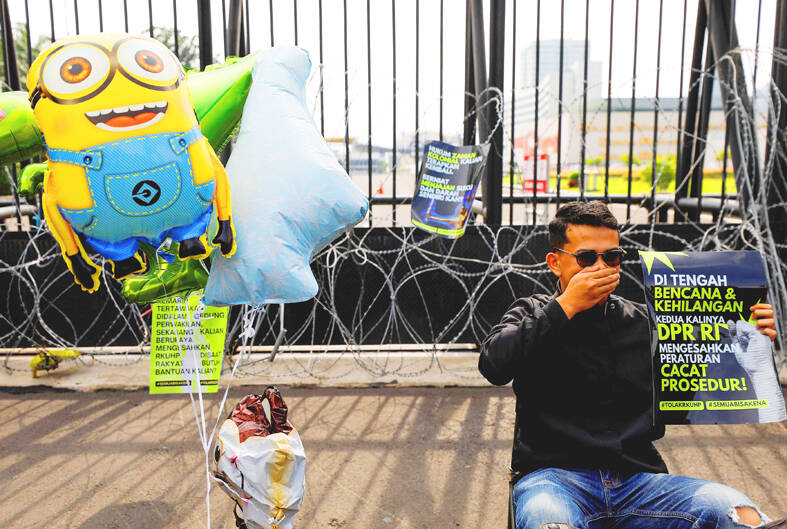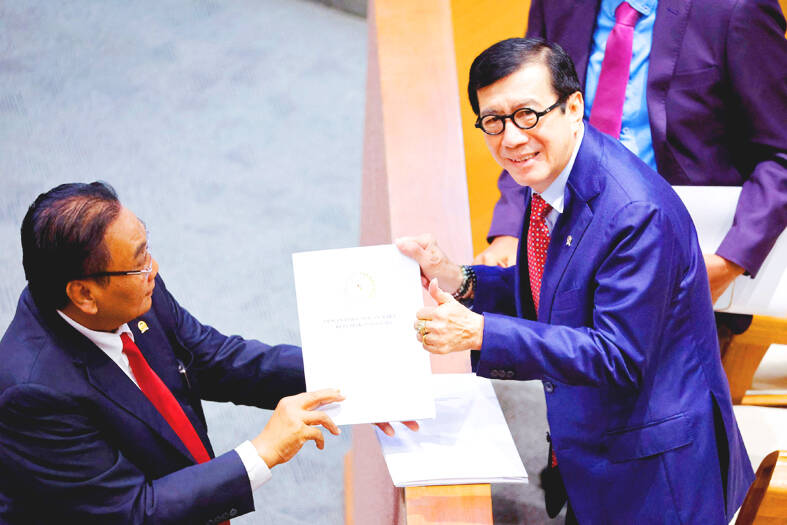The Indonesian People’s Consultative Assembly yesterday passed a long-awaited and controversial revision of its penal code that criminalizes extramarital sex for citizens and visiting foreigners alike.
After ratification, the new criminal code must be signed by the president, Indonesian Deputy Minister of Law and Human Rights Edward Omar Sharif Hiariej said.
The criminal code does not apply immediately.

Photo: Reuters
He said the new law “has a lot of implementing regulations that must be worked out, so it’s impossible in one year,” but takes a maximum of three years to transition from the old code to the new one.
A copy of the amended criminal code obtained by The Associated Press includes several revised articles that make sex outside marriage punishable by a year in jail and cohabitation by six months, but adultery charges must be based on police reports lodged by their spouse, parents or children.
It also says the promotion of contraception and religious blasphemy are illegal, and it restores a ban on insulting a sitting president and vice president, state institutions and national ideology. Insults to a sitting president must be reported by the president and can lead to up to three years in jail.

Photo: Reuters
Hiariej said the government provided “the strictest possible explanation that distinguishes between insults and criticism.”
The code maintains that abortion is a crime, but it adds exceptions for women with life-threatening medical conditions and for rape, provided that the fetus is less than 12 weeks old, in line with what is already regulated in the 2004 Medical Practice Act.
Rights groups criticized some of the revisions as overly broad or vague and warned that rushing them into the new criminal code could penalize normal activities and threaten freedom of expression and privacy rights.
However, some advocates hailed it as a victory for the country’s LGBTQ minority. Lawmakers during a fierce deliberation session eventually agreed to repeal an article proposed by Islamic groups that would have made gay sex illegal.
The code would also preserve the death penalty within the criminal justice system despite calls from the National Commission on Human Rights and other groups to abolish capital punishment, as dozens of other countries have done.
The new code says the death penalty is imposed alternatively with a probationary period. This means a judge cannot immediately impose a death sentence. If within a period of 10 years the convict behaves well, then the death penalty is changed to life imprisonment or 20 years’ imprisonment.
The code also expands the blasphemy law and maintains a five-year prison term for deviations from the central tenets of Indonesia’s six recognized religions: Islam, Protestantism, Catholicism, Hinduism, Buddhism and Confucianism. Citizens face a 10-year sentence under the bill for associating with organizations that follow Marxist-Leninist ideology and a four-year sentence for spreading communism.
Human Rights Watch yesterday said that laws penalizing criticism of public leaders are contrary to international law, and that some forms of expression are considered insulting is not sufficient to justify restrictions or penalties.
“The danger of oppressive laws is not that they’ll be broadly applied, it’s that they provide avenue for selective enforcement,” said Andreas Harsono, a senior Indonesia researcher at the group.
Many hotels, including in tourism areas like Bali and metropolitan Jakarta, will risk losing their visitors, he added.
“These laws let police extort bribes, let officials jail political foes, for instance, with the blasphemy law,” Harsono said.

POLITICAL PRISONERS VS DEPORTEES: Venezuela’s prosecutor’s office slammed the call by El Salvador’s leader, accusing him of crimes against humanity Salvadoran President Nayib Bukele on Sunday proposed carrying out a prisoner swap with Venezuela, suggesting he would exchange Venezuelan deportees from the US his government has kept imprisoned for what he called “political prisoners” in Venezuela. In a post on X, directed at Venezuelan President Nicolas Maduro, Bukele listed off a number of family members of high-level opposition figures in Venezuela, journalists and activists detained during the South American government’s electoral crackdown last year. “The only reason they are imprisoned is for having opposed you and your electoral fraud,” he wrote to Maduro. “However, I want to propose a humanitarian agreement that

ECONOMIC WORRIES: The ruling PAP faces voters amid concerns that the city-state faces the possibility of a recession and job losses amid Washington’s tariffs Singapore yesterday finalized contestants for its general election on Saturday next week, with the ruling People’s Action Party (PAP) fielding 32 new candidates in the biggest refresh of the party that has ruled the city-state since independence in 1965. The move follows a pledge by Singaporean Prime Minister Lawrence Wong (黃循財), who took office last year and assumed the PAP leadership, to “bring in new blood, new ideas and new energy” to steer the country of 6 million people. His latest shake-up beats that of predecessors Lee Hsien Loong (李顯龍) and Goh Chok Tong (吳作棟), who replaced 24 and 11 politicians respectively

Young women standing idly around a park in Tokyo’s west suggest that a giant statue of Godzilla is not the only attraction for a record number of foreign tourists. Their faces lit by the cold glow of their phones, the women lining Okubo Park are evidence that sex tourism has developed as a dark flipside to the bustling Kabukicho nightlife district. Increasing numbers of foreign men are flocking to the area after seeing videos on social media. One of the women said that the area near Kabukicho, where Godzilla rumbles and belches smoke atop a cinema, has become a “real

‘WATER WARFARE’: A Pakistani official called India’s suspension of a 65-year-old treaty on the sharing of waters from the Indus River ‘a cowardly, illegal move’ Pakistan yesterday canceled visas for Indian nationals, closed its airspace for all Indian-owned or operated airlines, and suspended all trade with India, including to and from any third country. The retaliatory measures follow India’s decision to suspend visas for Pakistani nationals in the aftermath of a deadly attack by shooters in Kashmir that killed 26 people, mostly tourists. The rare attack on civilians shocked and outraged India and prompted calls for action against their country’s archenemy, Pakistan. New Delhi did not publicly produce evidence connecting the attack to its neighbor, but said it had “cross-border” links to Pakistan. Pakistan denied any connection to